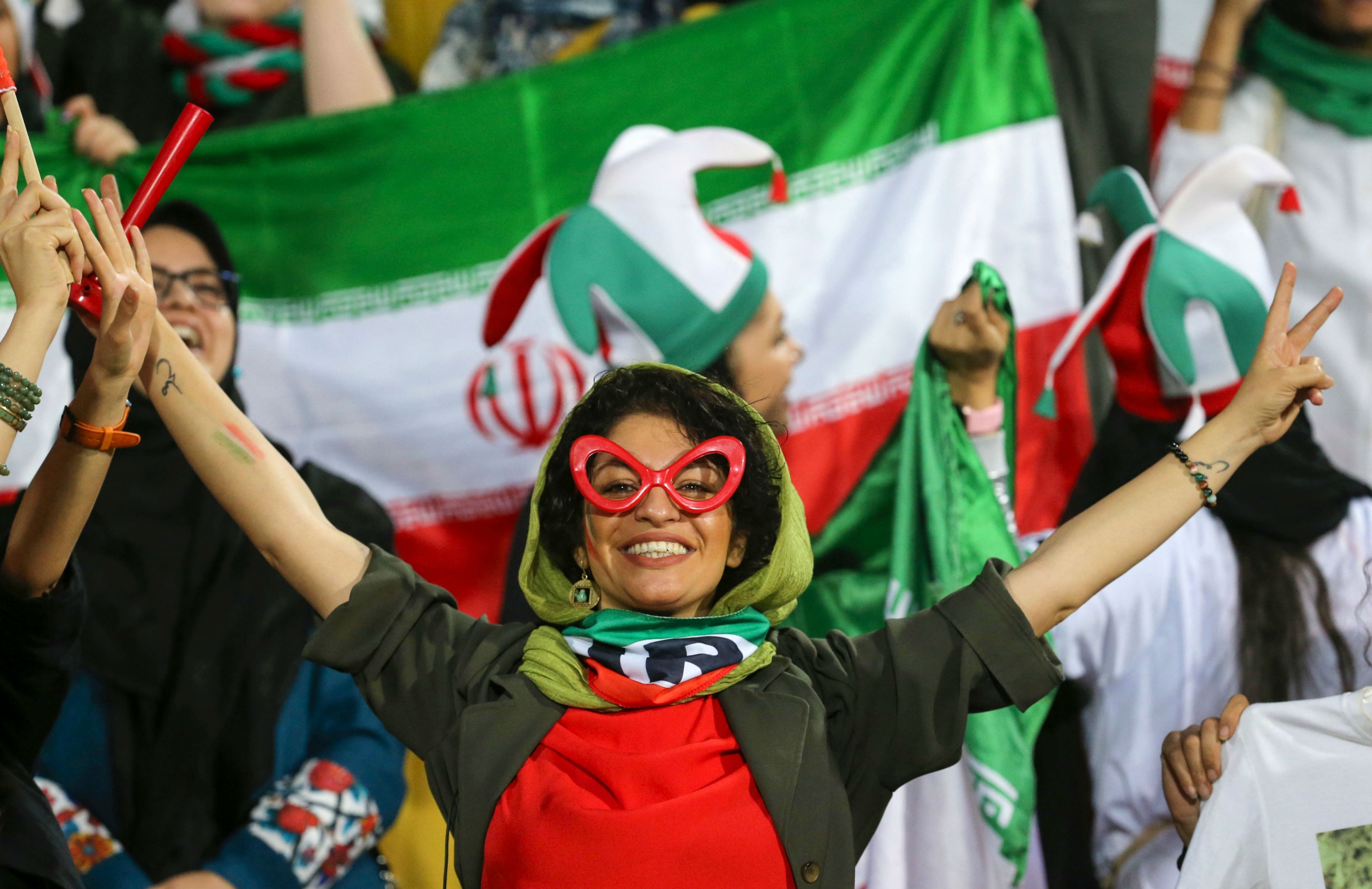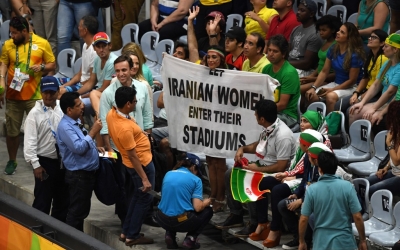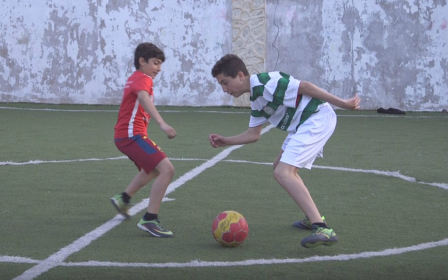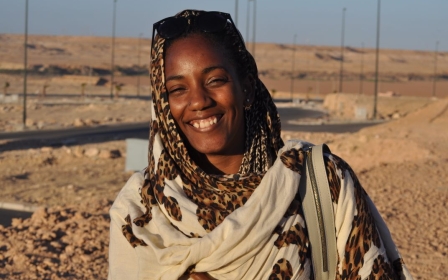'It was unforgettable': Iranian women rejoice as stadium ban comes to an end

Stepping out of Tehran’s Azadi stadium carrying a vuvuzela horn, Hoda Mazaheri couldn’t have looked happier.
“When the speaker at the stadium was welcoming the fans and said ‘ladies and gentlemen’, my heartbeat went up and it was unforgettable,” the young football fan told Middle East Eye
Mazaheri was one of 4,000 Iranian women in the ground to watch Iran beat Cambodia 14-0, the first match female fans have been allowed into since the Islamic Revolution.
It was the culmination of months of civil activism, and followed the death of one Iranian fan, Sahar Khodayari, who died after setting herself alight in protest at her prosecution for attending a match.
World football governing body FIFA had threatened to suspend Iran from the 2022 tournament if it did not change its rules and allow women to attend international matches.
New MEE newsletter: Jerusalem Dispatch
Sign up to get the latest insights and analysis on Israel-Palestine, alongside Turkey Unpacked and other MEE newsletters
'We brought with ourselves some magical luck, because we scored 14 goals'
- Najme Farhaani, 27
Demand for the tickets allocated to women was astronomical, and the female section sold out within minutes of being put online last week.
In the hours before kickoff, an electric atmosphere surrounded the stadium, as women and girls arrived early and were met with a warm welcome and free fruit and juice.
Many who were unable to buy tickets stood at the stadium’s turnstiles, wishing for a miracle to happen and be let in. Following some consultations with government officials, they often were, with jubilant, sometimes tearful, results.
Though a group of men outside the stadium carried a banner welcoming their Iranian sisters, inside the ground there were a lot of empty seats in the men’s sections.
There was more than enough atmosphere created in the sliver earmarked for women and girls, however, whose Icelandic “thunder clap” boomed around the 90,000-person stadium.
“During the match I didn’t sit, for even one second, and we kept cheering nonstop,” Najme Farhaani, 27, told MEE as she left the ground.
“And, of course, we brought with ourselves some magical luck, because we scored 14 goals.”
Disguised as men
Previously, Iranian women had to disguise themselves as men to watch live matches, and faced arrest if discovered.
Thursday was the first time Farhaani had openly been to a football game since she was 16.
“When I was a child, I used to accompany my dad to the stadium. Then when I became around 16, I entered Azadi disguised as men,” she said.
“At the time, the young men around me recognised that I was a woman and they sought to respect me by not swearing.”
Accompanying the fans were around 40 female police officers, who looked on from close by, occasionally ordering women to stop smoking cigarettes.
A sterner warning followed when chants lauding Khodayari, known as the Blue Girl, began to be bellowed.
Masoume Nazari, 30, painted an Iranian flag on her cheek.
“If I want to speak fairly, I should say the ‘fati commandos’ behaved well and were kind to us, and I didn’t see any of them picking on us owing to our hijab,” she said, using a sarcastic name for policewomen.
However, Sara Rasouli, 24, told MEE: “The policewomen kept notifying us to observe our hijab, and their populous presence was to some extent giving us a sense of insecurity.”
In terms of the football, the spectators couldn’t have asked for a better outcome.
Iranians on social media joked that the female fans’ encouragement lay behind the extraordinary 14 goals Iran scored.
The greater victory, however, belonged to the women in the ground, who were applauded by the players after full-time.
“I screamed so much that I think I have caught a cough,” Mazaheri joked.
'I screamed so much that I think I have caught a cough'
- Hoda Mazaheri, fan
“When the captain of Iran’s national team Masoud Shojai brought all the players close to us, I was really choked with emotions. Right on!”
Once the referee blew his whistle, bringing the game to a close, women chanted “Azadi stadium, await us”, a message that they are adamant to be present in future matches.
“I always regretted I couldn’t go the stadium when I was young,” an elderly woman with greying hair told MEE.
“Now that I was able I’m so happy, and excited that I could go home on foot from the stadium.”
Injection of happiness
Suffering under the heavy pressure of US sanctions, Iranians have had little to cheer about in recent months. But some have speculated that women being allowed into stadiums may inject some happiness into the veins of society.
Aman-allah Gharaei Moghadam, a sociologist and professor at Iran’s University of Shahid Beheshti, believes the presence of Iranian women will have short- and long-term effects in the country.
“In the short term, we will witness mental calmness and happiness in the country,” Gharaei Moghadam told MEE.
“But in the long term, which is very important for the sociology, this will give more self-confidence to women who no longer feel that their rights are being violated, and will also lead to more unity inside the country.”
The sociologist voiced his hope that the female presence in Azadi stadium would lay the foundation for more attention to women’s rights.
“Half of Iran’s society consists of women, and they shouldn’t be limited because there is no difference between them and men, and should both enjoy all the social rights.”
Hardliners have long resisted women’s presence in sports stadiums, urging religious authorities to state their opposition to letting women attend matches.
However, it seems the campaigns led by Iranian women and Khodayari’s death has helped to soften their stance.
Once fiercely opposed to women spectators, the hardline Fars news agency has now changed its tone, writing on Friday: “Now that the government has decided [to let women in the stadiums], we should hope that [male] fans respect the women.”
Meanwhile, Ali Rabie, Iran’s government spokesperson who also was present in Azadi, said: “Today’s behaviour of women in Azadi stadium guaranteed their presence in the next matches.”
Future games are likely to see a larger allocation of tickets for women. The next test will be whether female fans will be allowed into the domestic league as well.
Middle East Eye delivers independent and unrivalled coverage and analysis of the Middle East, North Africa and beyond. To learn more about republishing this content and the associated fees, please fill out this form. More about MEE can be found here.






